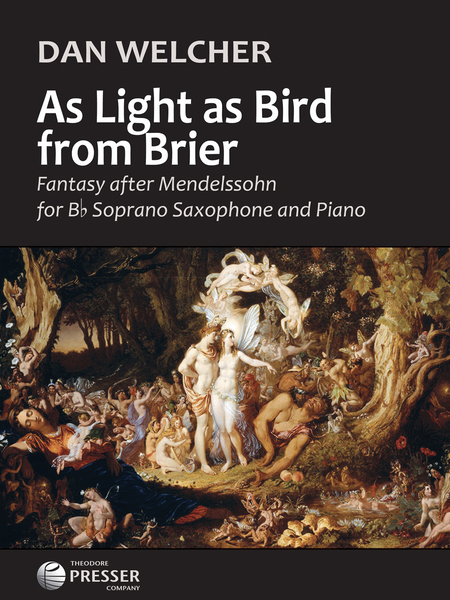As Light as Bird from Brier
Fantasy after Mendelssohn
-
Ships in 1 to 2 weeks
Details
Description
SKU: PR.164002950
Fantasy after Mendelssohn. Composed by Dan Welcher. Sws. Set of Score and Parts. 20+8 pages. Duration 10 minutes. Theodore Presser Company #164-00295. Published by Theodore Presser Company (PR.164002950).ISBN 9781491114568. UPC: 680160633449. 9 x 12 inches.
Dan Welcher’s fascinating work for soprano sax is both a refraction of Mendelssohn’s music for A Midsummer Night’s Dream, and his own incidental music to Shakespeare’s comedy. The work’s title, AS LIGHT AS BIRD FROM BRIER, quotes from Oberon (King of the Fairies) invoking revelry at the play’s climactic wedding scene. Welcher’s fantasy skips among the most beloved themes of Mendelssohn’s Midsummer – giving the saxophonist quite a workout, and the listener a midsummer delight.
AS LIGHT AS BIRD FROM BRIER is loosely based on Shakespeare’s play A Midsummer Night’s Dream, which has haunted me since I was nine years old. My parents subscribed me to The Children’s Record Guild, and every month a new 78rpm vinyl record would arrive in the mail. They were mostly fairy tales and “kids lit,” but in this case it was a very condensed performance of the actual play, with Mendelssohn’s music. I loved it immediately, and still do – I saw a performance in 2014 at the Stratford Festival that literally stalks my dreams.When I was commissioned by saxophonist Stephen Page to compose a work for soprano saxophone and piano two years later, I channeled Mendelssohn as an inspiration: specifically, the Overture, the Scherzo, the Intermezzo, the fairy’s song “You spotted snakes with double tongue,” and the Rustics’ Dance. But it’s not a pastiche – most of the music is completely my own, though attentive listeners will detect snatches of Mendelssohn’s haunting score throughout.This piece joins MILL SONGS and FLORESTAN’S FALCON among works honoring my favorite 19th-century composers (in those cases, Schubert and Schumann) without ripping them off. As Stravinsky did in his ballet Pulcinella, I have borrowed fragments of melody from a much-loved composer, and made a fabric of harmonies and scales that are genetically related to Mendelssohn, but unmistakably Welcher.In this work, the saxophonist is Puck – skittish, dazzlingly fast, and brilliant in the outer parts, and a mischievous Cupid in the long, central Love Song. (Remember how Puck anoints Titania’s eyes with the juice from a magic flower, which causes her to fall in love with Bottom the weaver, who has been bewitched and wears a donkey’s head?) The music traces Puck’s magic flight, the finding of the flower, Titania’s love-scene with Bottom and her fairies, and the rustic players – whose rehearsal of the funniest play-within-the-play in literature is interrupted by Puck’s dirty tricks.I greatly enjoyed the process of writing this piece, and often found myself quite moved even as I was writing it... which rarely happens. Stephen Page, who commissioned the work, is a consummate artist (and a bit of a Puck himself). The title comes from Oberon’s final speech in the play:Through the house, give glimmering light,By the dead and drowsy fire.Every elf and fairy spriteHop as light as bird from brier,And this ditty, after me,Sing, and dance it trippingly.

 Share
Share